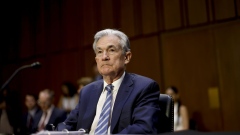Apr 21, 2021
Dogecoin barks but Bitcoin would bite
, Bloomberg News
Coinbase listing debut lifts Bitcoin to record high
Every dog has its day. For Dogecoin, it’s April 20. The dog-themed digital currency that was started as a joke in 2013 jumped more than 200 per cent in five days as part of a meme-driven mass trade to mark International Weed Day. It has already fallen back by 24 per cent.
This is a normal state of affairs for a volatile memecoin where two wallets control 40 per cent of the tokens. It also fits our pandemic present, as trust in institutions erodes and narratives about digital disruption fill the void. Crypto’s killer app of mass speculation has also helped Bitcoin to an all-time high and Coinbase Global Inc. to a US$64 billion market capitalization.
What this doesn’t look like yet is the future of money. And fittingly, a different kind of digital-currency philosophy was flagged by U.K. Chancellor of the Exchequer Rishi Sunak just one day earlier: “Britcoin,” a silly pun with a serious purpose. The Bank of England and the Treasury are launching joint consultations and a task force on digital cash that could one day be issued by the central bank. Sunak wants some blockchain hype of his own.
As with other central-bank-digital-currency projects around the world, Britcoin’s aim is to help the real economy rather than woo Dogecoin fans. The immediate benefit is having a big national fintech project to attract talent and cash, especially after Brexit. Blockchain startups raised about US$2.6 billion in venture capital in the first three months of 2021 worldwide, more than in all of 2020. Not everyone wants to work for or with the state, and politicians have a bad track record picking fintech winners (Greensill anyone?), but it’s sensible.
If a central bank digital currency (CBDC) were to actually take off — with the caveat that this is years away in the U.S. and Europe — there would be other benefits. A 2016 BOE paper estimated a CBDC issuance equivalent to 30 per cent of gross domestic product could permanently raise GDP by as much as 3 per cent, due in part to lower transaction costs. It could also actually help the central bank conduct monetary policy more effectively. The competitive impact of offering consumers an account at the central bank would in theory push lenders to react more quickly to changes in interest rates.
Having all transactions stored on a state ledger would stoke privacy fears, and not just among the crypto-faithful. Still, these projects don’t have to be one-size-fits-all. The European Central Bank has proposed a possible system that allows users some privacy for small transactions, but requires basic checks for big ones. As an economist at the International Monetary Fund put it: “Perhaps you’ll get away with (anonymity) when buying cake, but not a new car.” In an era when the U.S. under Joe Biden wants to plug leaks in the international tax system, transaction transparency might be a selling point, not a drawback.
Again, so far, none of this sounds like a threat to today’s sought-after cryptocurrencies that offer the riches of digital gold and the speculative thrill of price volatility. It seems more a defensive response to the likes of Facebook Inc.-backed Diem, seen as a potential threat to the monetary order — a “wolf in sheep’s clothing,” as the German finance minister has put it. Investing in risky tokens is one thing, but governments aren’t keen to let consumer transaction data and bank deposits flow to Silicon Valley heavyweights without proper oversight.
Still, there are a few ways a post-pandemic emphasis on CBDCs could catch Bitcoiners and Dogecoiners unawares.
As the state extends its influence, it is going to want more rules and regulation on the entire crypto sector. Already the new head of the U.S. Securities and Exchange Commission, Gary Gensler, has warned of the need to keep crypto markets “free of fraud and manipulation.” There’s little chance Britcoin would be brought to market without shining a light on shady practices elsewhere — the risk, as with Gresham’s Law, is that bad money would drive out the good. Targeted probes are already ramping up, from New York’s ban on Tether to Ripple Labs Inc.’s SEC lawsuit.
And all of those consultations and task forces could result in a more open solution than we assume. Closer cooperation between central banks might result in a global e-money license, or global digital identity, as author David Birch has imagined, dropping rather than raising barriers. The competitive edge of freewheeling tokens promising instant transfer of value anywhere could be blunted — even in Bitcoin’s case.
Finally, as economies become increasingly cashless, consumers may be more willing to trust programmable money held at the central bank over racier alternatives. Regular electronic payments already feel like second nature for consumers, but the idea of CBDCs is also to build apps and services directly on top that make life easier: Think of direct interest payments, or paying fees instantly at source. As with China’s digital yuan project, the idea is to level the playing field and work with tech firms, not without them.
Maybe there will always be demand for Dogecoin, at least in April. But Britcoin should also have its day.





